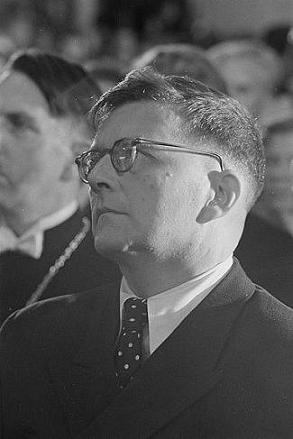Soviet Artist's Reply To Just Criticism, Half-Priced!
By Alexander Hough in Arts & Entertainment on Jul 30, 2009 4:20PM
This Saturday at Ravinia, the Chicago Symphony Orchestra will perform two of Dmitri Shostakovich's most famous works, the Symphony No. 5 in D Minor and the Violin Concerto No. 1 in A Minor. The programming of these two pieces should satisfy Shostakovich fans, but it'll also serve as a concise introduction to two sides of the Russian great's music.
Shostakovich burst onto the scene in 1926 at the age of nineteen with the premiere of his Symphony No. 1, the piece written for his graduation from the Leningrad Conservatory. This fame unfortunately coincided with Joseph Stalin's violent rise to power, and writing progressive classical music under a regime that extolled the proletariat was a dangerous job. Mixing in the occasional propagandist piece, Shostakovich managed to avoid major incident until January 26, 1936, when Stalin saw Shostakovich's opera "Lady Macbeth of the Mtsensk District." Put off by the uncomfortable dissonance, Stalin walked out of the performance. Two days later, an editorial denouncing the opera appeared in Pravda.
In Stalin's USSR, all publicity was definitely not good publicity, and although "Lady Macbeth" had received wide acclaim and success elsewhere in the country and around the world, Shostakovich shifted course after the denunciation, finishing but then burying his Symphony No. 4 (it finally premiered almost a decade after Stalin's death). He also set pen to paper and composed his Fifth Symphony in short order, premiering the piece on November 21, 1937.
The symphony, subtitled "a Soviet artist's reply to just criticism," was more formally organized and less abrasive than either "Lady Macbeth" or the Fourth Symphony. Stalin was pleased, and Shostakovich quickly reentered the government's good graces. The piece, however, is not slavish submission. Even while appealing to Stalin's ear, Shostakovich was able to communicate the terror and frustration of being an artist in the USSR, the defining feature of the composer's best works. Yes, the symphony ends with brass and pounding timpani, but it's unsettling rather than triumphant, and the desolate landscape of the Largo is among the loneliest music ever written.m>
The music that got Shostakovich into trouble will be represented by his Violin Concerto No. 1. Having "rehabilitated" himself through the Fifth Symphony, life was generally uneventful, in a good way. Then came the Zhdanov Doctrine in 1946, which divided the world between the imperialistic and the democratic, and Shostakovich, Sergei Prokofiev, and others were accused of writing music that was, once you navigate through the various euphemisms, too "out there" and therefore undemocratic. Shostakovich was working on this violin concerto when he was officially denounced and, like the Fourth Symphony, shelved the piece because it was exactly the type of music that angered the government. The concerto received its first performance on October 9, 1955, two and half years after Stalin's death.
History aside, the Chicago Symphony Orchestra is exactly the ensemble you want to see perform these pieces. The CSO consistently churns out exciting performances, particularly when it comes to dynamic, emotional works like the Fifth Symphony and the First Violin Concerto. The icing on top is the violin soloist, world-renowned Nadja Salerno-Sonnenberg, whose infamously caustic personality will hopefully come through in the concerto.
Ravinia's running a half-off special for reserved seats for this concert. And, as Free Things to Do in Chicago (via The Windy Citizen) points out, if you're a college student, reserved seats are $10 and lawn seats are free, as always.
Ravinia Pavilion, 200 Ravinia Park Rd., Highland Park, Saturday, August 1, at 7:30 p.m., reserved seats range from $12.50 to $27.50 (price includes discount) and $10 for students, lawn seats are $10 and free for students
